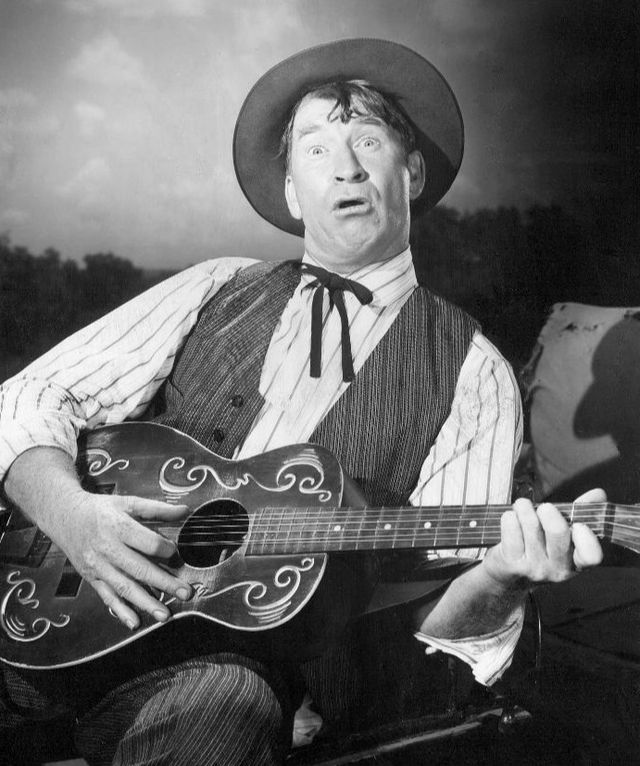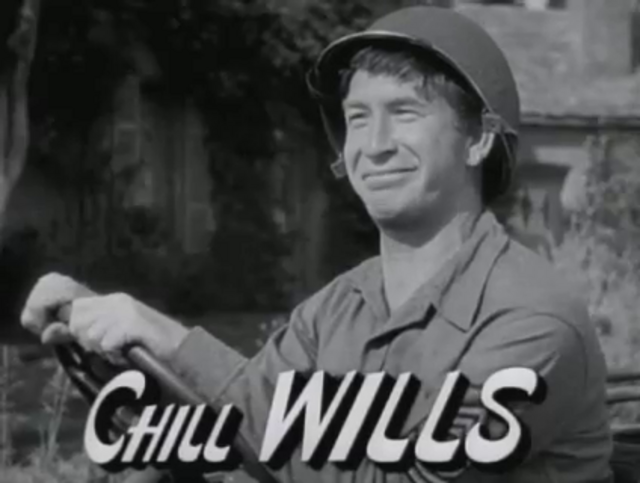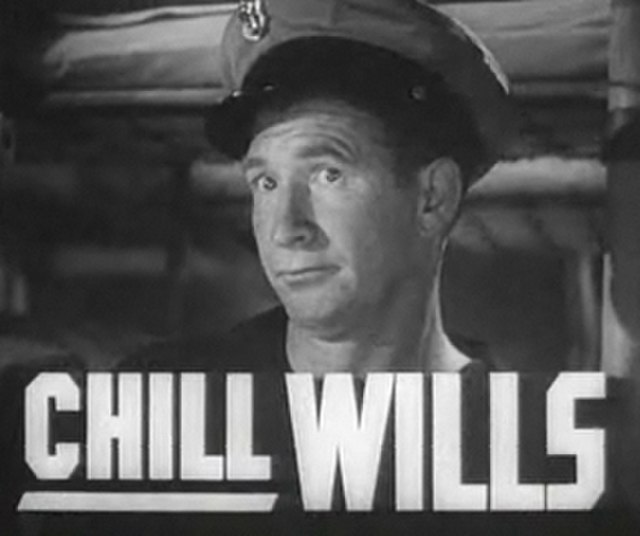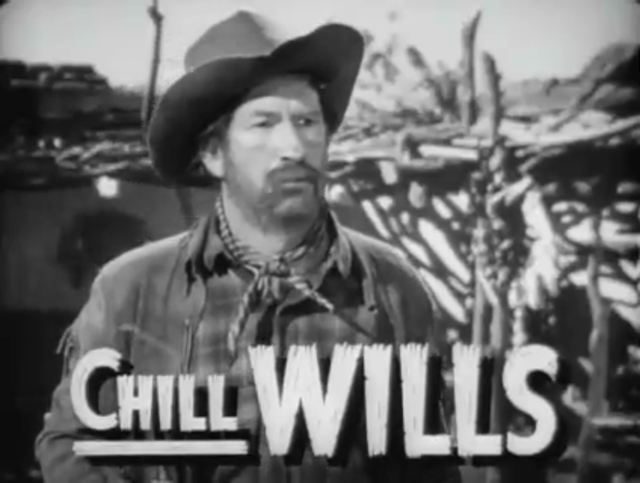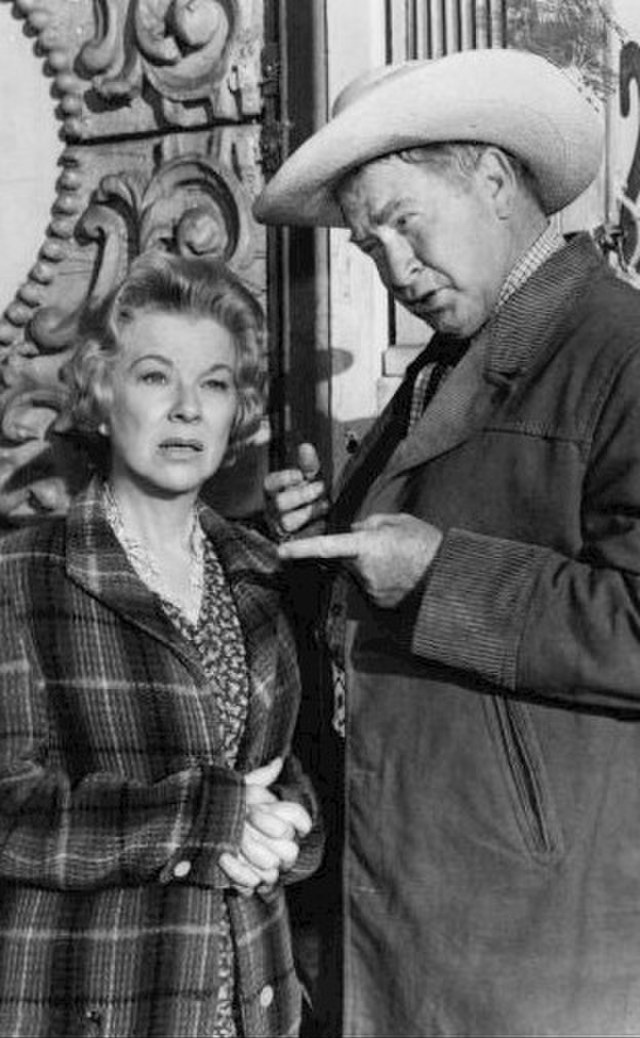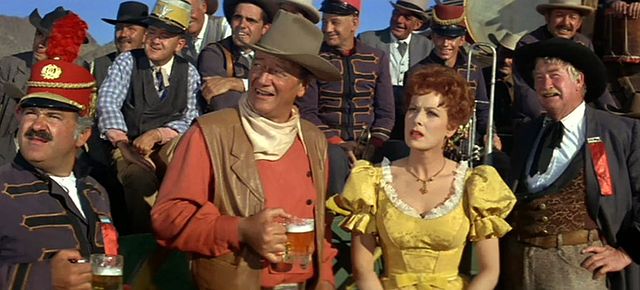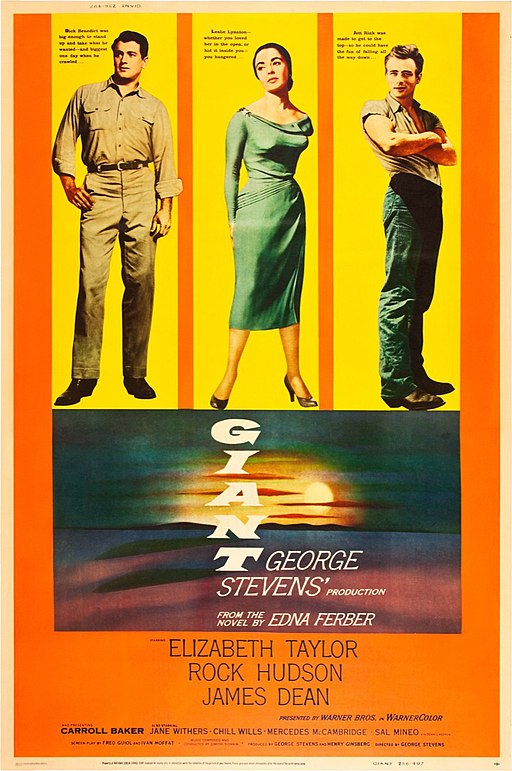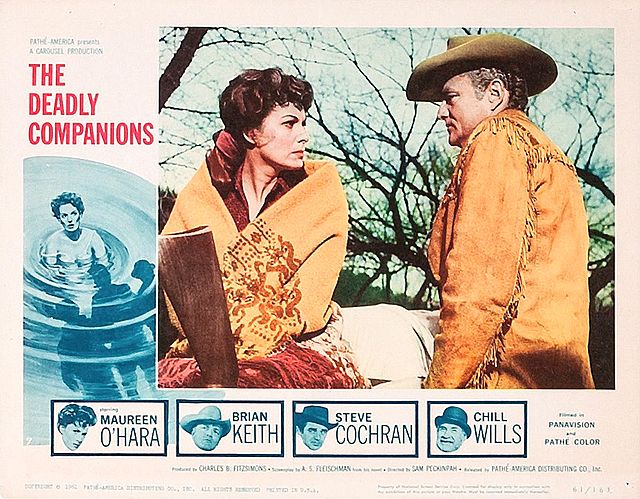Chill Wills (1902 – 1978)
Biography and Movie Career
Theodore Childress "Chill" Wills was born on July 18, 1902, in Seagoville, Texas, a small rural community outside Dallas. His nickname, "Chill," was a shortened form of his middle name, Childress, and it became his lifelong moniker. Raised in a modest household, Wills developed an early passion for music and performance. He taught himself to play the guitar, banjo, and other stringed instruments, displaying a natural talent for rhythm and melody.
A charismatic and outgoing individual, Wills quickly found that his deep, resonant voice was another unique asset. He began performing locally in his teens, often in vaudeville-style acts that combined singing, comedy, and storytelling. His early life in Texas instilled in him a love for Western culture, a theme that would later become central to his career.
________________________________________
Path Toward Success
In the 1930s, Wills moved to Hollywood, where he co-founded a musical group called The Avalon Boys. The group gained popularity performing Western and folk songs with tight harmonies and a humorous flair. They appeared in several films, most notably Way Out West (1937), alongside the comedic duo Laurel and Hardy. This exposure helped Wills establish himself in the entertainment industry.
By the early 1940s, Wills transitioned from being a musician to a character actor. He had a natural ability to portray warm, humorous, and occasionally eccentric characters, and his distinctive voice became one of his trademarks. His early film roles were small, but he quickly gained recognition in movies such as Meet Me in St. Louis (1944) and The Yearling (1946), the latter earning him critical praise for his nuanced performance as a kindhearted beekeeper.
Wills cemented his reputation as a beloved character actor in the 1950s, with appearances in John Ford's Rio Grande (1950) and Giant (1956). He became a fixture in Westerns, often playing comic relief or wise, seasoned cowboys. In The Alamo (1960), he portrayed Beekeeper, a role that earned him an Academy Award nomination for Best Supporting Actor. Although his campaign for the Oscar drew criticism for its aggressive and self-serving tone, the nomination itself testified to his talent.
________________________________________
Personal Life and Marriages
Chill Wills married Betty Chappelle in 1928, and the couple remained together for 43 years until her death in 1971. They had two children, Jill Wills and Will Wills. Wills was known as a devoted family man who enjoyed spending time at home with his wife and children. His humor and jovial personality were evident in his family life, where he was said to have entertained his kids with the same wit and charm he brought to his roles.
In 1973, Wills married Novadeen Googe, who became his second wife. The couple shared a happy, though relatively brief, marriage, as Wills passed away only five years later.
Outside of acting, Wills had a deep love for music, particularly Western and folk styles. He remained an avid guitarist throughout his life and often incorporated his musical abilities into his acting roles. He was also known for his philanthropy, supporting various charities related to children and the arts.
________________________________________
Later Years and Death
In the 1970s, Chill Wills continued to work in film and television, though at a slower pace. He made guest appearances on popular TV series such as Gunsmoke and The Beverly Hillbillies, where his signature style remained as endearing as ever.
Wills passed away on December 15, 1978, at the age of 76. The cause of death was cancer, which he had battled for some time. He was laid to rest at Grand View Memorial Park Cemetery in Glendale, California. His funeral was attended by family, friends, and admirers, who celebrated his life and career with fond memories of his humor, talent, and warmth.
________________________________________
Legacy
Chill Wills left behind a remarkable legacy in Hollywood. With over 70 film credits to his name, his career spanned several decades, during which he became one of the most recognizable character actors in American cinema. Known for his contributions to the Western genre and his unique ability to blend humor and heart, Wills remains an enduring figure in entertainment history.
His journey from a small-town Texan to a beloved star serves as a testament to his talent, determination, and larger-than-life personality. Whether through his rich baritone voice, his memorable performances, or his contributions to the golden era of Hollywood, Chill Wills continues to be celebrated as a true icon of American film and music.
Video Bio on Chill WIlls
His Measurements
• Height: Approximately 6 feet 2 inches (188 cm)
• Build: Stocky and robust, fitting his roles in Westerns and character-driven parts.
• Distinctive Features:
• Deep, gravelly voice
• Strong facial features, including a prominent jaw and expressive eyes
• Often seen with a broad, friendly smile
An Analysis of Chill Wills' Acting Style
Chill Wills was a quintessential character actor, known for his ability to blend humor, warmth, and authenticity into his performances. His acting style was deeply rooted in his unique personality and rich life experiences, particularly his upbringing in Texas, which lent him a genuine affinity for Western-themed roles. Here’s a closer look at the distinctive qualities that defined his acting style:
________________________________________
A Distinctive Voice
Wills' deep, gravelly voice was one of his most recognizable traits. It was both commanding and comforting, making him a natural choice for narrators, wise mentors, or comic relief characters. His voice added depth to his roles, often serving as a tool to convey humor, gravitas, or a sense of familiarity. This vocal quality made him a standout in ensemble casts, where his lines carried a unique resonance.
________________________________________
Natural Humor
Wills had a knack for delivering humor in a way that felt effortless and organic. Whether he played a comedic sidekick or a gruff yet endearing ranch hand, his timing and delivery were impeccable. His humor often stemmed from his characters’ eccentricities—quirky mannerisms, unexpected one-liners, or playful banter with other characters.
In films like McLintock! (1963), Wills' humor was an integral part of the story, where his portrayal of the loyal ranch hand Drago added levity to the film’s more dramatic moments. His comedic style was never forced; it flowed naturally from the situations his characters found themselves in.
________________________________________
Authenticity in Western Roles
Wills was a natural fit for Westerns, embodying the rugged, down-to-earth spirit of the genre. His Texan roots and personal connection to the culture gave his performances an authenticity that resonated with audiences. He often portrayed characters who were wise, reliable, and deeply rooted in their environment, such as Uncle Bawley in Giant (1956) and Beekeeper in The Alamo (1960).
His ability to adapt to a wide range of Western archetypes—from comedic cowhands to sage older men—showcased his versatility within the genre. Wills had a way of making even minor roles memorable, often becoming a highlight of the films he appeared in.
________________________________________
Warmth and Approachability
A hallmark of Wills’ performances was the warmth he brought to his characters. Whether he played a quirky companion or a caring mentor, his characters exuded a sense of friendliness and approachability. He had a gift for connecting with audiences on an emotional level, making them root for him even in smaller, supporting roles.
This quality was especially evident in The Yearling (1946), where his portrayal of Buck Forrester captured a mix of humor and compassion. His characters often felt like people you might know—relatable, human, and sincere.
________________________________________
Adaptability Across Genres
While Wills was best known for Westerns, his acting style was versatile enough to adapt to other genres. In films like Meet Me in St. Louis (1944), a family musical, and Leave Her to Heaven (1945), a psychological drama, he proved his ability to fit into stories beyond the open plains. Even in these roles, he brought his signature authenticity and charm, grounding his performances in a way that felt true to his nature.
________________________________________
Scene-Stealing Charisma
Though primarily a supporting actor, Wills had a scene-stealing quality that made him unforgettable. His characters often had a lively energy or a memorable quirk that drew the audience’s attention, even in ensemble casts or brief appearances. He understood how to make the most of his screen time, using body language, facial expressions, and vocal intonations to leave a lasting impression.
________________________________________
Conclusion
Chill Wills’ acting style was a rare combination of warmth, humor, and authenticity. His distinctive voice and natural charisma allowed him to shine in a wide range of roles, particularly in Westerns, where his Texan roots added a layer of credibility. Whether providing comic relief, offering sage advice, or simply lending a touch of humanity to a scene, Wills had an undeniable ability to connect with audiences and leave a lasting impact. His legacy as a character actor is a testament to his talent, versatility, and the enduring appeal of his unique persona.
Memorable Quotes
• On his persona:
"I’m the original cowboy ham. I can ride, rope, and act—most of the time, in that order."
• On acting in Westerns:
"A cowboy's gotta have his hat, his horse, and a good laugh. If you ain’t laughing, you ain’t living."
• On his distinctive voice:
"God gave me this gravel pit of a voice for a reason. It’s kept me in beans and biscuits for years."
• On his Oscar campaign controversy for The Alamo:
"All I ever wanted was for folks to know I gave it my all. I reckon I gave ‘em more than they bargained for."
• From The Alamo (1960):
"A man’s gotta take a stand sometime, even if it don’t make much sense to others."
• From McLintock! (1963):
"When you’re in trouble, it’s always better to face it with a full belly and a smile."
• From Giant (1956):
"Life out here ain’t about fancy talk or big dreams. It’s about grit and the will to keep on."
• From Rio Grande (1950):
"Doctors patch up wounds, but it’s humor that heals the soul."
• On his career:
"I didn’t always play the star, but I always played my part."
• On Westerns and life:
"The West wasn’t just a place; it was a way of thinking. You lived simple, you laughed often, and you left your mark."
Awards and Recognition
Academy Award Nomination
• Best Supporting Actor (The Alamo, 1960)
Chill Wills received an Oscar nomination for his role as Beekeeper in John Wayne’s epic Western The Alamo. This nomination was a testament to his ability to bring depth and charm to supporting characters.
The nomination was overshadowed by controversy, as Wills’ self-promotion campaign—run by his publicist—was perceived as overly aggressive. The campaign included an infamous ad that read:
“We’re for Chill Wills as Best Supporting Actor. Presented by his Alamo cousins.”
John Wayne publicly criticized this move, but it did little to diminish Wills’ talent as an actor.
________________________________________
Golden Boot Award
• Golden Boot Award Recipient (1975)
Wills was honored with the Golden Boot Award for his significant contributions to Western films and television. This award celebrated his lifelong dedication to the genre, in which he was a standout figure.
The Golden Boot is often considered a career achievement award for actors, directors, and creators who have made an impact on Western storytelling.
________________________________________
Star on the Hollywood Walk of Fame
• Hollywood Walk of Fame (Television)
Chill Wills was recognized with a star on the Hollywood Walk of Fame for his work in television, where he made numerous memorable appearances.
His star, located at 6923 Hollywood Boulevard, commemorates his legacy as a performer who brought joy and authenticity to audiences through both film and TV.
________________________________________
Other Notable Recognition
• Cultural Icon in Western Cinema
While not formal awards, Wills' work in films like Rio Grande, Giant, and McLintock! earned him a lasting place in the hearts of Western fans.
He is often cited in retrospectives as one of the most endearing and reliable character actors in Hollywood’s Golden Age.
________________________________________
Posthumous Recognition
• Legacy Acknowledgements
Since his passing, Wills has been celebrated in numerous retrospectives and Western film tributes. His performances continue to be admired for their humor, warmth, and authenticity.
Chill Wills on Gunsmoke
Chill Wills made notable guest appearances on Gunsmoke, the iconic Western TV series that aired from 1955 to 1975. His roles on the show showcased his ability to bring humor, warmth, and complexity to the diverse characters he portrayed.
________________________________________
Memorable Characters:
o Wills played various guest roles, including Elihu Gorman and Abe Blocker, demonstrating his versatility.
o His characters often embodied the rugged individualism and moral dilemmas central to the series, blending seamlessly into Gunsmoke's richly developed frontier world.
Adding Humor and Charm:
o Wills’ signature wit and folksy humor provided a balance to Gunsmoke's often serious and dramatic storylines.
o He had a unique ability to inject levity without undermining the tension or gravity of the episode, making his roles memorable even in minor appearances.
Emotional Depth:
o In episodes like “Elihu Gorman” (1968), Wills added emotional nuance to his character, portraying a man with a blend of vulnerability and strength.
o His performances often carried an undercurrent of humanity, making his characters relatable and compelling.
Movies with Chill Wills
1930s:
• "It's a Gift" (1934): A comedy where Wills appears as a campfire singer (uncredited).
• "Bar 20 Rides Again" (1935): A Western featuring Wills as a background singer and henchman.
• "Way Out West" (1937): A Laurel and Hardy comedy where Wills, as part of The Avalon Boys, provides the deep singing voice for Stan Laurel.
1940s:
• "The Westerner" (1940): A Western drama where Wills plays Southeast, a member of Judge Roy Bean's court.
• "Western Union" (1941): A film about the construction of the Western Union telegraph line, with Wills portraying Homer Kettle.
• "Tarzan's New York Adventure" (1942): An adventure film where Wills plays Manchester Montford, involved in bringing Tarzan to New York.
• "Meet Me in St. Louis" (1944): A musical about a family's life leading up to the 1904 World's Fair, with Wills as Mr. Neely.
• "Leave Her to Heaven" (1945): A film noir where Wills portrays Leick Thome, involved in a tale of obsessive love and jealousy.
• "The Yearling" (1946): A family drama about a boy adopting a fawn, with Wills as Buck Forrester.
1950s:
• "Francis" (1950): A comedy featuring Wills as the uncredited voice of Francis, a talking mule.
• "Rio Grande" (1950): A Western where Wills plays Dr. Wilkins, the regimental surgeon, alongside John Wayne.
• "Giant" (1956): An epic drama about a Texas ranching family, with Wills as Uncle Bawley.
• "Gun for a Coward" (1957): A Western exploring family dynamics, featuring Wills as Loving.
1960s:
• "The Alamo" (1960): A historical epic where Wills portrays Beekeeper, a companion of Davy Crockett.
• "McLintock!" (1963): A Western comedy with Wills as Drago, the loyal ranch hand to John Wayne's character.
• "The Rounders" (1965): A Western comedy where Wills plays Jim Ed Love, a wealthy rancher.
1970s:
• "Pat Garrett & Billy the Kid" (1973): A Western focusing on the relationship between Pat Garrett and Billy the Kid, with Wills as Lemuel.
• "Mr. Billion" (1977): A comedy adventure where Wills portrays Colonel Clayton T. Winkle.
TV Series with Chill Wills
Frontier Circus
Wills starred as "Colonel Kasey Thompson" in this CBS series that aired during the 1961–1962 season, focusing on the adventures of a traveling circus in the Old West.
The Rounders
In the 1966–1967 ABC comedy-western series, Wills played "Jim Ed Love," a shady Texas rancher, reprising his role from the 1965 film of the same name.
The Texan
Wills guest-starred in a 1960 episode titled "The Eyes of Captain Wylie," showcasing his talent in Western narratives.
Gunsmoke
He made multiple guest appearances between 1968 and 1973, portraying characters such as Elihu Gorman and Abe Blocker in this iconic Western series.
Alfred Hitchcock Presents
Wills appeared as Mr. Kilmer in the episode "The West War Lock Incident," demonstrating his range beyond Westerns.
Night Gallery
In the segment "The Little Black Bag," he played Heppelwhite, further highlighting his versatility in different genres.
Burke's Law
Wills guest-starred in episodes such as "Who Killed the Richest Man in the World?" and "Who Killed the Swinger on a Hook?" portraying characters like General Hector Harder and Harry Riggs.

